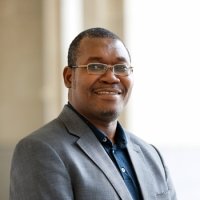Building Peace in the Central African Republic: The Role of Agricultural Extension Services
On October 21, 2019 the Wilson Center Africa Program hosted the event “Building Peace in the Central African Republic: The Role of Agricultural Extension Services.” Dr. Monde Muyangwa, Director of the Africa Program moderated the event. The event featured Fr. Paterne Auxence Mombe, current Southern Voices Network for Peacebuilding Scholar at the Wilson Center, and Ph.D. student, Tangaza University, Nairobi, Kenya; Dr. Jessica Anderson, Conflict Advisor, Center for Resilience, U.S. Agency for International Development; and, Mr. Michel Mbei, Country Program Manager, Central African Republic, Search for Common Ground. This event assessed the causes of insecurity in the Central African Republic (CAR) and its impact on agriculture and food security, while giving particular attention to the potential of agricultural extension services to improve agricultural productivity and livelihoods while also contributing to peacebuilding. The discussion also looked at lessons learned from other post-conflict countries and how those options may be adapted to the context of CAR.
Dr. Anderson opened the conversation by highlighting the feedback loop between food insecurity and conflict. She noted that conflicts are disruptive to farmers as they cannot plant or access markets, while the collapse of agriculture is a boon to recruitment for armed groups. Dr. Anderson stressed three key factors that practitioners must integrate into their interventions, including conflict sensitivity and do no harm, tailored interventions that correspond to a particular conflict and context, and the building of trust between citizens and government through shared information. She noted that understanding the factors on the ground shaping a conflict are vital to developing an intervention that is effective and will do no harm. It is important to create “peace dividends” that can address an acute issue while promoting social cohesion. Dr. Anderson noted that agricultural programs (including agricultural extension services) can promote peace dividends by increasing trust between groups, sharing information, and producing positive interactions with the state. She looked at the case of a water catchment project in Darfur, Sudan, which increased community involvement and helped to defuse the conflict between pastoralists and farmers by facilitating cooperation between both groups. She pointed to this success in Darfur as an example for other African countries looking to leverage agriculture extension services in an effort to build sustainable food systems while promoting peace. Questioned about the integration of agriculture into peacebuilding frameworks, Dr. Anderson noted that USAID is developing the Bureau for Resilience and Food Security specifically to improve these cross-sectoral linkages.
Fr. Mombe reaffirmed the link between poverty and hunger, and stressed the importance of agricultural development in the context of increasing rates of food insecurity. He noted that CAR illustrates the cycle of conflict and hunger, as 45% of people within CAR are food insecure and the presence of armed groups has negatively impacted food production, which has fallen by 65%. Reinforcing Dr. Anderson’s point, he pointed to the underdeveloped agricultural sector in CAR as a driver of conflict as it pushes people, particularly youth, to join armed groups. Fr. Mombe also emphasized that resource scarcity has exacerbated the conflict between herders and farmers. He called attention to the fact that CAR has been named the “hungriest nation” for five consecutive years despite international efforts to combat hunger in the country. He argued that a rejuvenation of agricultural extension services could provide a great benefit to agricultural development, while helping to change the situation in rural areas—home to many of the factors driving CAR’s conflict. Fr. Mombe recommended a shift in spending from aid for emergency interventions to investment in agricultural development, identifying strategies to demobilize combatants (such as increased employment opportunities in agriculture), and increased funding for agriculture (as CAR is an agrarian economy and 70% of people in the country rely on agriculture as a means for work and livelihood). During the Q&A with the audience, Fr. Mombe noted the success of agricultural extension services in post-conflict Mozambique, Sierra Leone, and Liberia, and underlined that grassroots efforts to address the needs of rural communities and would be foot soldiers will lead to gains in all sectors of development.
Mr. Mbei shared a perspective from the ground by providing an overview of Search for Common Ground (SFCG)’s activities in CAR. Using their Common Ground Approach, SFCG focuses on working with local, youth, religious, traditional, and government leaders to identify common needs and build mutual trust. Mr. Mbei argued that implementing the Common Ground Approach helps to address mistrust and division at all levels in CAR, and allows for former opponents to become collaborators for sustainable development. He pointed out the need to build people’s capacity to have open dialogues in order to create an environment for building trust. He noted the importance of providing communities with meaningful platforms for engagement, and observed that social media and radio have created space for improved transparency in CAR. Empowering communities to address their own grievances will reduce conflict. Mr. Mbei recommended agricultural extension services as one potential tool to engage with youth and deter them from joining armed groups, noting that improving agricultural productivity could contribute to a sustainable and lasting peace. When questioned about the lack of development in other sectors—especially education—in CAR, Mr. Mbei argued providing security and access to basic needs such as food and water will lead to development in other fields.
The SVNP is a continent-wide network of African policy, research and academic organizations that works with the Wilson Center’s Africa Program to bring African knowledge and perspectives to U.S., African, and international policy on peacebuilding in Africa. Established in 2011 and supported by the generous financial support of the Carnegie Corporation of New York, the project provides avenues for African researchers and practitioners to engage with, inform, and exchange analyses and perspectives with U.S., African, and international policymakers in order to develop the most appropriate, cohesive, and inclusive policy frameworks and approaches to achieving sustainable peace in Africa.
This event was livetweeted and webcast. Follow the Africa Program Twitter account @AfricaUpClose and catch up on the conversation #FoodSecurity
Speakers

Graduate Student, Tangaza University
Introduction

Moderator

Hosted By

Africa Program
The Africa Program works to address the most critical issues facing Africa and US-Africa relations, build mutually beneficial US-Africa relations, and enhance knowledge and understanding about Africa in the United States. The Program achieves its mission through in-depth research and analyses, public discussion, working groups, and briefings that bring together policymakers, practitioners, and subject matter experts to analyze and offer practical options for tackling key challenges in Africa and in US-Africa relations. Read more
